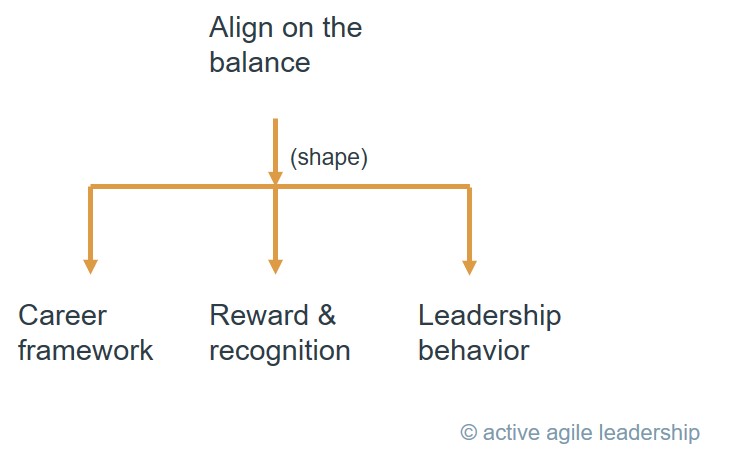7. Reward growth

Why it matters
If career and rewards systems do not mirror the desired culture, coworkers will spot this which weakens the authenticity of “you say this, but you do that”.
People who work in an Agile environment are expected to:
● Experiment and take risks (“try”)
● Learn from failure and pivot (“adapt”)
● Take initiatives and problem-solve (“improve”)
● Embrace a growth mindset (“I’m on a learning journey”)
● Collaborate with others (“I can’t do this alone”)
This means the environment and culture where people exercise these habits need to be supportive. One of the elements that shapes the behaviors in the organization and hence the culture, is your reward system.
A common problem
A typical situation you are likely to face with crafting a team-based organization:
“So you want us to work in teams, but you still reward performance appraisals at an individual level. That doesn’t add up.”
The good news is that there are better alternatives. It takes a little bit of effort to put in place, but if you do, then the benefit would be that the authenticity of a team-based and experimental culture becomes stronger and more compelling. This builds trust, which is hard currency when dealing with uncertainty.
What drives people?
Many studies have been made on what drives and engages people. Daniel Pink summarizes three factors that stand out in his book “Drive”:
- Autonomy
- Mastery
- Purpose
The surprising truth is that solving hard problems, aka having autonomy to figure out the right way to solve hard problems, is in itself a strong intrinsic motivator in knowledge work. So whenever the environment we work in makes it difficult to do this, we respond negatively. If you believe that there is some truth to this, then the interesting question becomes, “how can we remove such impediments and create a more conducive environment for solving problems to make our people grow?”
One of the areas where you can exercise this is in your reward system and career frameworks.
Practice: Decide on the balance between the three factors

At some stage, you will need to decide on a framework for what to reward and promote, for example, when people make careers. The practice: Before you set up a career framework or reward system, have a candid conversation and align with your executive leadership team on what the balance should be between these three factors:
- Skills (growth)
- Behaviors that drive the desired culture (for example teamwork, experiment)
- Getting things done
Why? Because the core assumptions that the executive leadership team carries, how they live and exercise their leadership (including between each other), will have a strong impact on your culture.
Practice: Translate this balance into your career framework and reward system

Of course, there are more factors than these that influence culture. And you are free to replace this practice with something better.
The benefit of this approach is that you now have three influential components that send a shared message.
References
“Drive: The Surprising Truth About What Motivates Us“, Pink Dan, Riverhead Books, 2011
“On culture principles in Agile organisations“, Modern Agile